英语常用形容词
- 格式:doc
- 大小:33.00 KB
- 文档页数:3
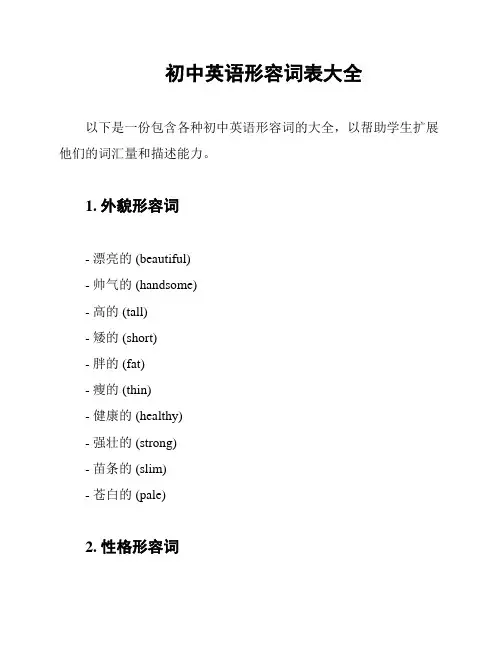
初中英语形容词表大全以下是一份包含各种初中英语形容词的大全,以帮助学生扩展他们的词汇量和描述能力。
1. 外貌形容词- 漂亮的 (beautiful)- 帅气的 (handsome)- 高的 (tall)- 矮的 (short)- 胖的 (fat)- 瘦的 (thin)- 健康的 (healthy)- 强壮的 (strong)- 苗条的 (slim)- 苍白的 (pale)2. 性格形容词- 友好的 (friendly)- 内向的 (introverted) - 外向的 (extroverted) - 聪明的 (smart)- 懒惰的 (lazy)- 勇敢的 (brave)- 害羞的 (shy)- 有趣的 (funny)- 有耐心的 (patient)- 有创造力的 (creative) 3. 感觉形容词- 开心的 (happy)- 难过的 (sad)- 兴奋的 (excited)- 害怕的 (afraid)- 紧张的 (nervous)- 惊讶的 (surprised)- 放松的 (relaxed)- 满意的 (satisfied)- 振奋的 (thrilled)- 担心的 (worried)4. 研究形容词- 聪明的 (intelligent)- 用功的 (hardworking)- 有才华的 (talented)- 专心的 (focused)- 有创意的 (creative)- 有毅力的 (determined)- 有自信的 (confident)- 认真的 (serious)- 热爱研究的 (passionate about learning) - 良好的 (good)5. 环境形容词- 美丽的 (beautiful)- 干净的 (clean)- 拥挤的 (crowded)- 嘈杂的 (noisy)- 安静的 (quiet)- 繁忙的 (busy)- 悠闲的 (relaxed)- 新鲜的 (fresh)- 潮湿的 (damp)这些形容词是初中英语中常用的,可以帮助学生更准确地描述人物、物品和环境。
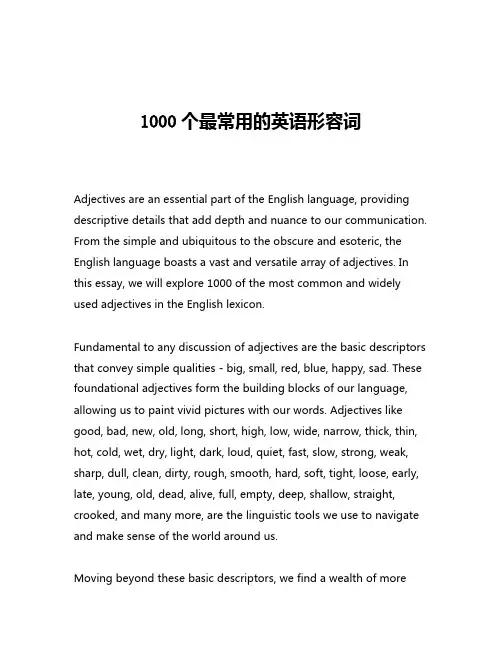
1000个最常用的英语形容词Adjectives are an essential part of the English language, providing descriptive details that add depth and nuance to our communication. From the simple and ubiquitous to the obscure and esoteric, the English language boasts a vast and versatile array of adjectives. In this essay, we will explore 1000 of the most common and widely used adjectives in the English lexicon.Fundamental to any discussion of adjectives are the basic descriptors that convey simple qualities - big, small, red, blue, happy, sad. These foundational adjectives form the building blocks of our language, allowing us to paint vivid pictures with our words. Adjectives like good, bad, new, old, long, short, high, low, wide, narrow, thick, thin, hot, cold, wet, dry, light, dark, loud, quiet, fast, slow, strong, weak, sharp, dull, clean, dirty, rough, smooth, hard, soft, tight, loose, early, late, young, old, dead, alive, full, empty, deep, shallow, straight, crooked, and many more, are the linguistic tools we use to navigate and make sense of the world around us.Moving beyond these basic descriptors, we find a wealth of morenuanced and sophisticated adjectives. Elegant, graceful, magnificent, stunning, breathtaking, and exquisite are but a few of the words we might use to capture the beauty of a sunset or a work of art. Intelligent, clever, brilliant, insightful, perceptive, and astute describe the cognitive prowess of a thinker or scholar. Adjectives like kind, compassionate, benevolent, altruistic, and charitable speak to the moral and ethical dimensions of human character.The English language also offers a rich tapestry of adjectives to convey emotional states and psychological qualities. Joyful, ecstatic, elated, euphoric, gleeful, and overjoyed express the heights of human happiness, while sorrowful, melancholic, despondent, dejected, and inconsolable capture the depths of human sadness. Adjectives like anxious, nervous, apprehensive, tense, and on edge reflect states of worry and unease, while calm, serene, tranquil, peaceful, and zen-like denote inner calm and equanimity.Adjectives can also be used to describe physical attributes and appearances. Handsome, attractive, gorgeous, stunning, and ravishing are just a few of the words we might use to praise someone's good looks, while homely, unattractive, plain, and ordinary convey a less flattering assessment. Tall, short, thin, thick, muscular, slender, stocky, and burly are all adjectives that can be used to describe the human form, while bald, hairy, wrinkled, and youthful speak to specific physical characteristics.Beyond the human realm, adjectives are essential for describing the natural world and the inanimate objects that populate it. Lush, verdant, fertile, and fecund are words that evoke the vibrant abundance of a thriving ecosystem, while barren, desolate, arid, and inhospitable suggest a more stark and unforgiving landscape. Adjectives like shiny, glossy, dull, and tarnished can be used to describe the surface qualities of various materials, while heavy, lightweight, sturdy, fragile, and delicate speak to their physical properties.In the realm of technology and innovation, we find a wealth of adjectives to capture the latest advancements. Cutting-edge, state-of-the-art, groundbreaking, revolutionary, and pioneering are all words that suggest the forefront of technological progress, while outdated, antiquated, obsolete, and archaic convey a sense of technological obsolescence.Adjectives are also essential for describing abstract concepts and ideas. Profound, insightful, thought-provoking, and enlightening are words that speak to the depth and significance of a particular idea or philosophy, while superficial, simplistic, naive, and elementary suggest a more cursory or rudimentary understanding.Ultimately, the 1000 most common English adjectives represent adiverse and multifaceted tapestry of descriptive language, allowing us to convey the full breadth and complexity of the human experience. From the simple and straightforward to the nuanced and sophisticated, these adjectives are the linguistic tools we use to make sense of the world around us and to express the richness of our inner lives.。
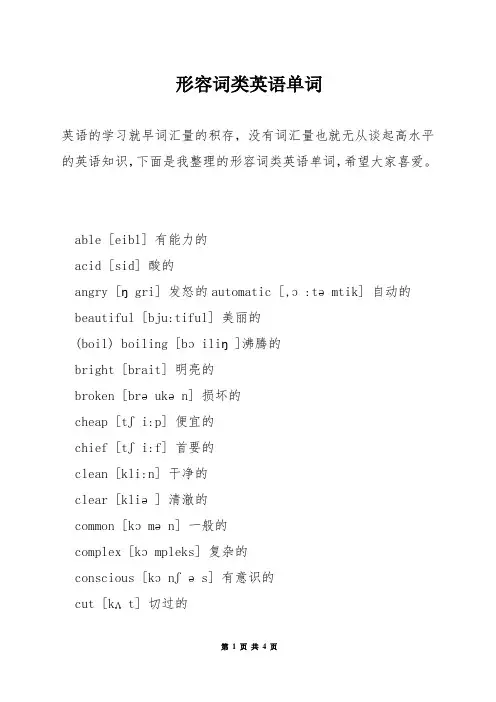
形容词类英语单词英语的学习就早词汇量的积存,没有词汇量也就无从谈起高水平的英语知识,下面是我整理的形容词类英语单词,希望大家喜爱。
able [eibl] 有能力的acid [sid] 酸的angry [ŋgri] 发怒的automatic [,ɔ:təmtik] 自动的beautiful [bju:tiful] 美丽的(boil) boiling [bɔiliŋ]沸腾的bright [brait] 明亮的broken [brəukən] 损坏的cheap [tʃi:p] 便宜的chief [tʃi:f] 首要的clean [kli:n] 干净的clear [kliə] 清澈的common [kɔmən] 一般的complex [kɔmpleks] 复杂的conscious [kɔnʃəs] 有意识的cut [kʌt] 切过的deep [di:p] 深的dependent [dipendənt] 依靠的elastic [ilstik] 有弹性的electric [ilektrik] 电的equal [i:kwəl] 相等的fertile [fə:tail] 多产的fixed [fikst] 固定的flat [flt] 平的frequent [fri:kwənt, frikwent] 频繁的,常常的 2形容词相关的英语单词general [dʒenərəl] 一般的great [greit] 伟大的hanging [hŋiŋ] 悬挂的hard [ha:d] 硬的;困难的healthy [heli]健康的hollow [hɔləu] 空的,空心的important [impɔ:tənt] 重要的kind [kaind] 亲切的living [liviŋ]活的male [meil] 男性的married [mrid] 已婚的material [mətiəriəl] 物质的medical [medikəl] 医学的military [militəri] 军事的natural [ntʃərəl] 自然的necessary [nesisəri] 必要的normal [nɔ:məl] 正常的parallel [prəlel] 平行的past [pa:st, pst] 过去的physical [fizikəl] 身体的;物质的 political [pəlitikəl] 政治的3形容词类英语词汇quick [kwik] 快的quiet [kwaiət] 宁静的smooth [smu:] 平滑的sticky [stiki] 粘的stiff [stif] 呆板的;僵硬的straight [streit] 直的strong [strɔŋ, strɔ:ŋ]强壮的;牢固的 sudden [sʌdən] 突然的sweet [swi:t] 甜的thick [ik]厚的tight [tait] 紧的tired [taiəd] 疲乏的true [tru:] 真实的violent [vaiələnt] 激烈的;暴力的warm [wɔ:m] 温暖的wet [wet] 湿的wide [waid] 宽阔的wise [waiz] 聪慧的;明智的young [jʌŋ]年青的。
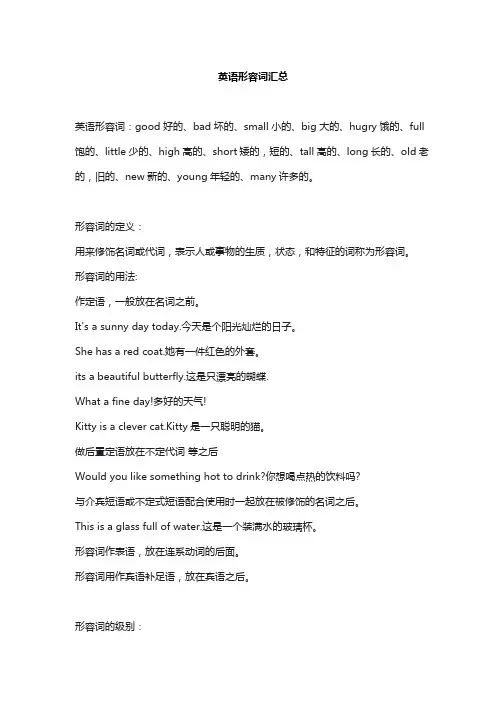
英语形容词汇总英语形容词:good好的、bad坏的、small小的、big大的、hugry饿的、full 饱的、little少的、high高的、short矮的,短的、tall高的、long长的、old老的,旧的、new新的、young年轻的、many许多的。
形容词的定义:用来修饰名词或代词,表示人或事物的生质,状态,和特征的词称为形容词。
形容词的用法:作定语,一般放在名词之前。
It's a sunny day today.今天是个阳光灿烂的日子。
She has a red coat.她有一件红色的外套。
its a beautiful butterfly.这是只漂亮的蝴蝶.What a fine day!多好的天气!Kitty is a clever cat.Kitty是一只聪明的猫。
做后置定语放在不定代词等之后Would you like something hot to drink?你想喝点热的饮料吗?与介宾短语或不定式短语配合使用时一起放在被修饰的名词之后。
This is a glass full of water.这是一个装满水的玻璃杯。
形容词作表语,放在连系动词的后面。
形容词用作宾语补足语,放在宾语之后。
形容词的级别:原级:即形容词的原形,用来说明人或事物的特征。
比较级:用在两个人或物之间的比较。
最高级:用来比较三个或三个以上的人或物。
形容词的规则变化:一般情况加-er或- est.以字母e结尾加-r或-st.以辅音字母加y结尾变y.以一个元音字母+-一个辅音字母且词尾音节重读时,双写词尾辅音字母加- er或-est.。
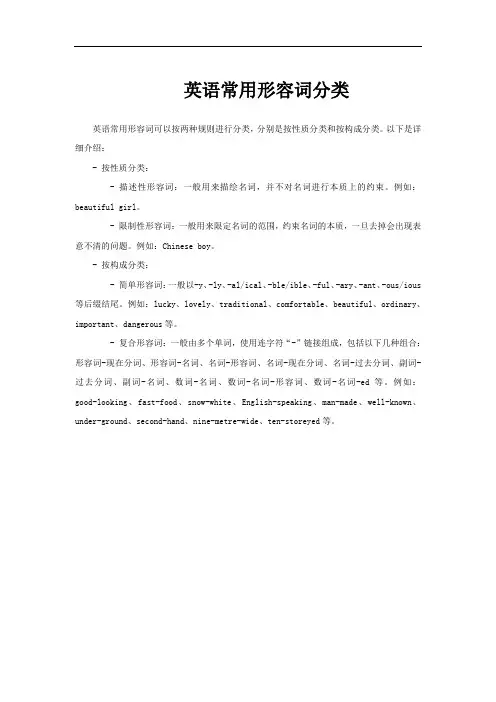
英语常用形容词分类
英语常用形容词可以按两种规则进行分类,分别是按性质分类和按构成分类。
以下是详细介绍:
- 按性质分类:
- 描述性形容词:一般用来描绘名词,并不对名词进行本质上的约束。
例如:beautiful girl。
- 限制性形容词:一般用来限定名词的范围,约束名词的本质,一旦去掉会出现表意不清的问题。
例如:Chinese boy。
- 按构成分类:
- 简单形容词:一般以-y、-ly、-al/ical、-ble/ible、-ful、-ary、-ant、-ous/ious 等后缀结尾。
例如:lucky、lovely、traditional、comfortable、beautiful、ordinary、important、dangerous等。
- 复合形容词:一般由多个单词,使用连字符“-”链接组成,包括以下几种组合:形容词-现在分词、形容词-名词、名词-形容词、名词-现在分词、名词-过去分词、副词-过去分词、副词-名词、数词-名词、数词-名词-形容词、数词-名词-ed等。
例如:good-looking、fast-food、snow-white、English-speaking、man-made、well-known、under-ground、second-hand、nine-metre-wide、ten-storeyed等。
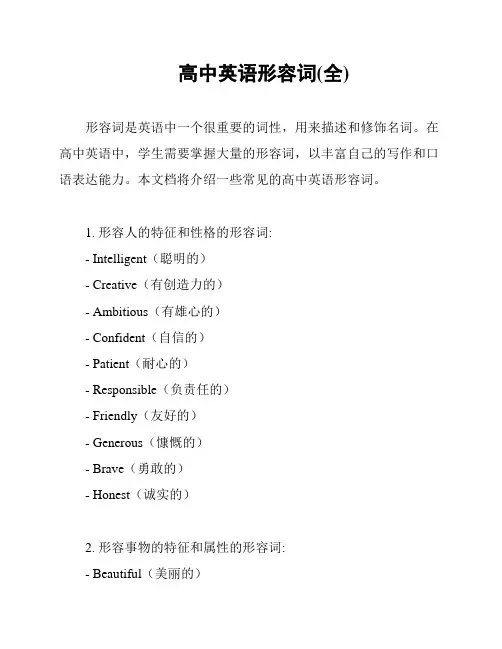
高中英语形容词(全)形容词是英语中一个很重要的词性,用来描述和修饰名词。
在高中英语中,学生需要掌握大量的形容词,以丰富自己的写作和口语表达能力。
本文档将介绍一些常见的高中英语形容词。
1. 形容人的特征和性格的形容词:- Intelligent(聪明的)- Creative(有创造力的)- Ambitious(有雄心的)- Confident(自信的)- Patient(耐心的)- Responsible(负责任的)- Friendly(友好的)- Generous(慷慨的)- Brave(勇敢的)- Honest(诚实的)2. 形容事物的特征和属性的形容词:- Beautiful(美丽的)- Delicious(美味的)- Expensive(昂贵的)- Exciting(令人兴奋的)- Interesting(有趣的)- Useful(有用的)- Important(重要的)- Challenging(具有挑战性的)- Relaxing(令人放松的)3. 形容情感和感受的形容词: - Happy(快乐的)- Sad(悲伤的)- Excited(兴奋的)- Proud(自豪的)- Surprised(惊讶的)- Nervous(紧张的)- Excited(激动的)- Relieved(宽慰的)- Frustrated(沮丧的)- Grateful(感激的)4. 形容自然和环境的形容词:- Beautiful(美丽的)- Green(绿色的)- Peaceful(宁静的)- Sunny(阳光明媚的)- Windy(有风的)- Rainy(多雨的)- Cold(寒冷的)- Hot(炎热的)- Humid(湿润的)- Snowy(下雪的)以上只是一些常见的高中英语形容词,学生们可以根据实际需要和语境进行灵活运用。
通过积累和研究这些形容词,可以提高自己的英语表达能力,使写作和口语更加生动和丰富。
*注意: 本文档所提供的内容是基于常见的单词和常见的用法,并未涉及具体语法使用。
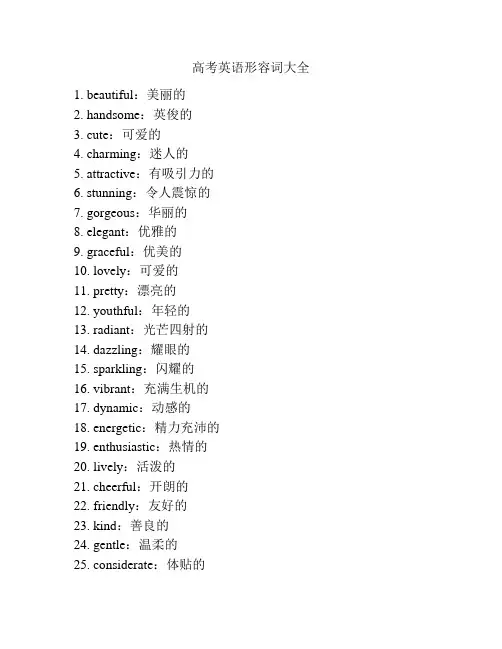
高考英语形容词大全1. beautiful:美丽的2. handsome:英俊的3. cute:可爱的4. charming:迷人的5. attractive:有吸引力的6. stunning:令人震惊的7. gorgeous:华丽的8. elegant:优雅的9. graceful:优美的10. lovely:可爱的11. pretty:漂亮的12. youthful:年轻的13. radiant:光芒四射的14. dazzling:耀眼的15. sparkling:闪耀的16. vibrant:充满生机的17. dynamic:动感的18. energetic:精力充沛的19. enthusiastic:热情的20. lively:活泼的21. cheerful:开朗的22. friendly:友好的23. kind:善良的24. gentle:温柔的25. considerate:体贴的26. patient:耐心的27. thoughtful:深思的28. intelligent:聪明的29. wise:明智的30. brilliant:卓越的31. talented:有才华的32. creative:有创造力的33. innovative:创新的34. inventive:善于创造的35. resourceful:足智多谋的36. diligent:勤奋的37. hardworking:努力工作的38. ambitious:有雄心的39. persistent:坚持不懈的40. determined:决心坚定的。
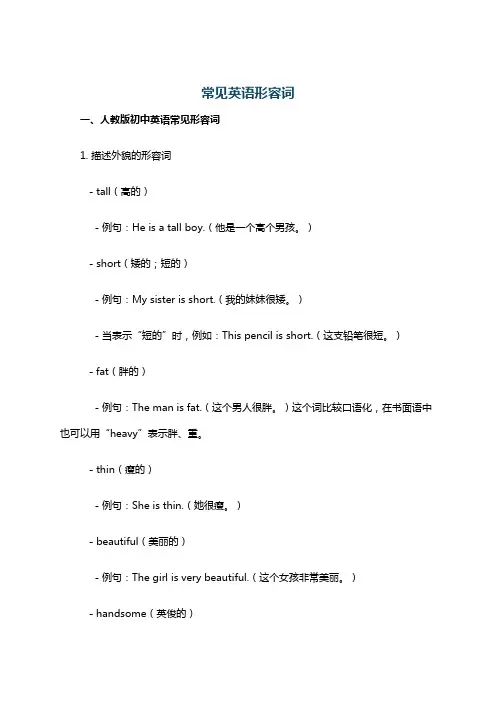
常见英语形容词一、人教版初中英语常见形容词1. 描述外貌的形容词- tall(高的)- 例句:He is a tall boy.(他是一个高个男孩。
)- short(矮的;短的)- 例句:My sister is short.(我的妹妹很矮。
)- 当表示“短的”时,例如:This pencil is short.(这支铅笔很短。
)- fat(胖的)- 例句:The man is fat.(这个男人很胖。
)这个词比较口语化,在书面语中也可以用“heavy”表示胖、重。
- thin(瘦的)- 例句:She is thin.(她很瘦。
)- beautiful(美丽的)- 例句:The girl is very beautiful.(这个女孩非常美丽。
)- handsome(英俊的)- 例句:My father is handsome.(我的爸爸很英俊。
)主要用于形容男性的外貌好看。
- ugly(丑陋的)- 例句:That monster is ugly.(那个怪物很丑陋。
)2. 描述性格的形容词- kind(和蔼的;善良的)- 例句:Miss Li is a kind teacher.(李老师是一位和蔼的老师。
)- friendly(友好的)- 例句:My classmates are friendly to me.(我的同学们对我很友好。
) - shy(害羞的)- 例句:The little girl is shy.(这个小女孩很害羞。
)- outgoing(外向的)- 例句:He is an outgoing boy.(他是一个外向的男孩。
)- quiet(安静的)- 例句:She is a quiet student.(她是一个安静的学生。
)- clever(聪明的)- 例句:The little boy is very clever.(这个小男孩非常聪明。
)- stupid(愚蠢的)- 例句:It's a stupid idea.(这是一个愚蠢的主意。
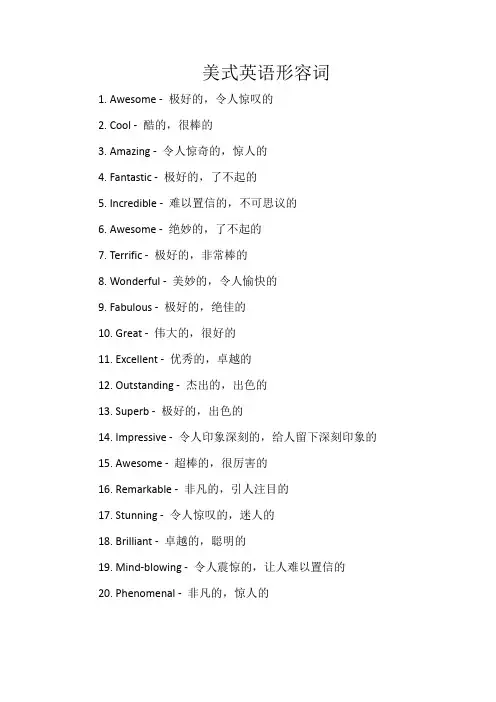
美式英语形容词
1. Awesome -极好的,令人惊叹的
2. Cool -酷的,很棒的
3. Amazing -令人惊奇的,惊人的
4. Fantastic -极好的,了不起的
5. Incredible -难以置信的,不可思议的
6. Awesome -绝妙的,了不起的
7. Terrific -极好的,非常棒的
8. Wonderful -美妙的,令人愉快的
9. Fabulous -极好的,绝佳的
10. Great -伟大的,很好的
11. Excellent -优秀的,卓越的
12. Outstanding -杰出的,出色的
13. Superb -极好的,出色的
14. Impressive -令人印象深刻的,给人留下深刻印象的
15. Awesome -超棒的,很厉害的
16. Remarkable -非凡的,引人注目的
17. Stunning -令人惊叹的,迷人的
18. Brilliant -卓越的,聪明的
19. Mind-blowing -令人震惊的,让人难以置信的
20. Phenomenal -非凡的,惊人的。
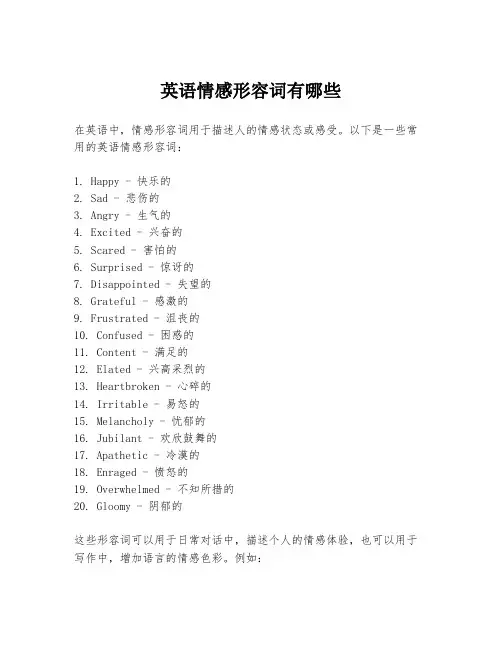
英语情感形容词有哪些
在英语中,情感形容词用于描述人的情感状态或感受。
以下是一些常用的英语情感形容词:
1. Happy - 快乐的
2. Sad - 悲伤的
3. Angry - 生气的
4. Excited - 兴奋的
5. Scared - 害怕的
6. Surprised - 惊讶的
7. Disappointed - 失望的
8. Grateful - 感激的
9. Frustrated - 沮丧的
10. Confused - 困惑的
11. Content - 满足的
12. Elated - 兴高采烈的
13. Heartbroken - 心碎的
14. Irritable - 易怒的
15. Melancholy - 忧郁的
16. Jubilant - 欢欣鼓舞的
17. Apathetic - 冷漠的
18. Enraged - 愤怒的
19. Overwhelmed - 不知所措的
20. Gloomy - 阴郁的
这些形容词可以用于日常对话中,描述个人的情感体验,也可以用于写作中,增加语言的情感色彩。
例如:
- She was happy when she heard the good news.
- He felt sad after watching the tragic movie.
- The students were excited about the upcoming trip.
- The news left her disappointed and frustrated.
使用这些形容词时,可以根据上下文选择合适的词汇,以更准确地传达情感。
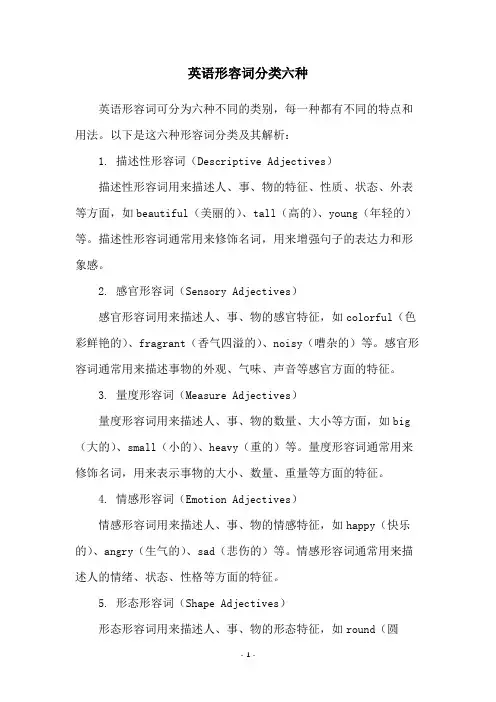
英语形容词分类六种英语形容词可分为六种不同的类别,每一种都有不同的特点和用法。
以下是这六种形容词分类及其解析:1. 描述性形容词(Descriptive Adjectives)描述性形容词用来描述人、事、物的特征、性质、状态、外表等方面,如beautiful(美丽的)、tall(高的)、young(年轻的)等。
描述性形容词通常用来修饰名词,用来增强句子的表达力和形象感。
2. 感官形容词(Sensory Adjectives)感官形容词用来描述人、事、物的感官特征,如colorful(色彩鲜艳的)、fragrant(香气四溢的)、noisy(嘈杂的)等。
感官形容词通常用来描述事物的外观、气味、声音等感官方面的特征。
3. 量度形容词(Measure Adjectives)量度形容词用来描述人、事、物的数量、大小等方面,如big (大的)、small(小的)、heavy(重的)等。
量度形容词通常用来修饰名词,用来表示事物的大小、数量、重量等方面的特征。
4. 情感形容词(Emotion Adjectives)情感形容词用来描述人、事、物的情感特征,如happy(快乐的)、angry(生气的)、sad(悲伤的)等。
情感形容词通常用来描述人的情绪、状态、性格等方面的特征。
5. 形态形容词(Shape Adjectives)形态形容词用来描述人、事、物的形态特征,如round(圆的)、square(方的)、straight(直的)等。
形态形容词通常用来描述事物的形态、结构等方面的特征。
6. 颜色形容词(Color Adjectives)颜色形容词用来描述人、事、物的颜色特征,如red(红色的)、blue(蓝色的)、green(绿色的)等。
颜色形容词通常用来描述事物的颜色特征。
【老外常说的10个形容词】1.great 太棒了;太好了2.amazing: 使人十分惊讶的3.awesome: 极好的;很棒的4.incredible 难以置信的;惊人的5.cool: 好;帅;酷;6.cute: 可爱的;逗人喜爱的7.excellent: 优秀的;8.wonderful: 极好的,绝妙的9.fabulous: 极妙的10.fantastic: 极出色的【三国人物的英文名】Sheldon:夏侯惇Wayne:魏延John:张颌Susan:孙尚香Marshall:马超David:典韦Pond:庞德Josh:贾诩Russell:鲁肃Charlie:张辽Cunning:甘宁Raymond:吕蒙Rachel:文丑Jeff:张飞Chocolate:诸葛亮Summary:司马懿Water:华佗Major:马忠Joey:周瑜Gay:关羽【电影styles】1. romance movie 爱情片2. detective movie 侦探片3. action movie 动作片4. musical 音乐片5. thriller 恐怖片6. comedy 喜剧片7. serial movies 系列片8. science fiction movie 科幻片war ~ 战争片;disaster ~ 灾难片;science fiction 科幻片;suspense ~ 悬疑片;costume ~ 古装片;erotic ~ 情色片;documentary 纪录片;inspirational ~ 励志片;animation ~ 动画片【美剧台词】1.You are on deck. 下一个是你,请做好准备。
2.Get cracking. 开始吧。
3.Be a lamb. 乖~4.Stop talking like that. 别那样说话。
5. It's consistent with my personality. 我一直就这性格。
描述性形容词英语词汇大全形容词是我们日常交流中常用的一类词汇,它们可以用来形容人、事、物的特征和性质。
在英语中,描述性形容词有很多种,每一种都可以用来描述不同的特征。
在本文中,将为大家介绍一些常见的描述性形容词,并按照字母顺序进行分类。
A类形容词:(以字母A开头)1. Adorable:可爱的2. Ambitious:有雄心的3. Amusing:有趣的4. Annoying:讨厌的5. Antsy:坐立不安的6. Arrogant:傲慢的7. Attractive:有魅力的8. Awful:糟糕的B类形容词:(以字母B开头)1. Bald:秃头的2. Big:大的3. Bitter:苦的4. Brave:勇敢的5. Bright:明亮的6. Broad:宽阔的7. Busy:忙碌的8. Bumpy:崎岖的C类形容词:(以字母C开头)1. Calm:平静的2. Cheerful:开心的3. Clumsy:笨拙的4. Cold:冷的5. Comfortable:舒适的6. Confused:困惑的7. Courageous:勇敢的8. Crazy:疯狂的D类形容词:(以字母D开头)1. Dangerous:危险的2. Dark:黑暗的3. Delicious:美味的4. Dirty:肮脏的5. Dull:无聊的6. Dynamic:充满活力的E类形容词:(以字母E开头)1. Easy:容易的2. Energetic:精力充沛的3. Envious:羡慕的4. Evil:邪恶的5. Excellent:优秀的6. Exciting:令人兴奋的7. Expensive:昂贵的F类形容词:(以字母F开头)1. Fabulous:极好的2. False:虚假的3. Familiar:熟悉的4. Fancy:奢华的5. Fast:快的6. Fearless:无所畏惧的7. Filthy:肮脏的8. Flaky:浮躁的G类形容词:(以字母G开头)1. Generous:慷慨的2. Gentle:温柔的3. Giant:巨大的4. Graceful:优雅的5. Greedy:贪婪的6. Grouchy:脾气坏的7. Gullible:易受骗的H类形容词:(以字母H开头)1. Handsome:帅气的2. Happy:快乐的3. Hardworking:努力工作的4. Healthy:健康的5. Helpful:乐于助人的6. Honest:诚实的7. Hungry:饥饿的I类形容词:(以字母I开头)1. Ignorant:无知的2. Ill:生病的3. Immense:巨大的4. Important:重要的5. Impossible:不可能的6. Inquisitive:好奇的7. Irritable:易怒的J类形容词:(以字母J开头)1. Jealous:嫉妒的2. Jolly:快乐的3. Joyful:愉快的4. Juicy:多汁的5. Juvenile:幼稚的K类形容词:(以字母K开头)1. Kind:友善的2. Knowledgeable:博学的L类形容词:(以字母L开头)1. Lame:糟糕的2. Lazy:懒惰的3. Little:小的4. Loud:大声的5. Lovable:可爱的6. Lovely:可爱的7. Lucky:幸运的M类形容词:(以字母M开头)1. Magnificent:壮丽的2. Mischievous:淘气的3. Mysterious:神秘的N类形容词:(以字母N开头)1. Nasty:让人讨厌的2. Neat:整洁的3. Nervous:紧张的4. Nice:友好的5. Nutritious:有营养的O类形容词:(以字母O开头)1. Obedient:听话的2. Obnoxious:令人讨厌的3. Odd:奇怪的4. Old-fashioned:过时的5. Open-minded:开放的6. Optimistic:乐观的P类形容词:(以字母P开头)1. Painful:痛苦的2. Perfect:完美的3. Playful:好玩的4. Polite:礼貌的5. Popular:受欢迎的6. Powerful:强大的7. Precious:珍贵的8. Proud:骄傲的9. Puzzled:困惑的Q类形容词:(以字母Q开头)1. Quick:快速的2. Quiet:安静的R类形容词:(以字母R开头)1. Realistic:现实的2. Relaxed:轻松的3. Reliable:可靠的4. Rude:粗鲁的S类形容词:(以字母S开头)1. Safe:安全的2. Scary:恐怖的3. Selfish:自私的4. Shiny:闪亮的5. Silly:愚蠢的6. Sleepy:困倦的7. Slow:慢的8. Small:小的9. Smart:聪明的10. Smelly:臭的11. Sneaky:偷偷摸摸的12. Soft:柔软的13. Sour:酸的14. Spicy:辣的15. Sticky:粘的16. Strong:强壮的17. Stubborn:固执的18. Successful:成功的19. Sweet:甜的T类形容词:(以字母T开头)1. Tall:高的2. Terrible:糟糕的3. Thoughtful:体贴的4. Tired:疲倦的U类形容词:(以字母U开头)1. Ugly:丑陋的2. Unique:独特的3. Unusual:不寻常的V类形容词:(以字母V开头)1. Valiant:勇敢的2. Vast:广阔的3. Victorious:胜利的W类形容词:(以字母W开头)1. Warm:温暖的2. Weak:虚弱的3. Wise:聪明的4. Witty:机智幽默的5. Wonderful:美好的6. Worried:担忧的Y类形容词:(以字母Y开头)1. Young:年轻的Z类形容词:(以字母Z开头)1. Zesty:充满活力的本文介绍了一些常见的描述性形容词,每一种形容词都有自己独特的用途和描述对象。
形容词总结英语形容词是英语中非常重要的一类词性,它用来修饰名词或代词,描述事物的性质、状态、特征等。
通过形容词的运用,我们可以使文章更加生动有趣,让读者对所描述的人物、事物有更加直观的感受。
在英语学习中,掌握各种形容词的用法非常关键。
本文将对常用的形容词进行分类总结,帮助读者更好地掌握英语中形容词的使用。
一、形容事物的特征1. 大小:big(大)、small(小)、large(大)、tiny(微小)、huge(巨大)、tiny(细小)示例句子:- The dog is small and cute.- She lives in a big house.- The elephant is huge.2. 颜色:red(红色)、blue(蓝色)、green(绿色)、yellow(黄色)、black(黑色)、white(白色)示例句子:- I love wearing a blue dress.- He has a black car.- The flower is red and beautiful.3. 形状:round(圆形)、square(正方形)、triangular(三角形)、oval(椭圆形)示例句子:- She has a round face.- The table is square.- The bottle has an oval shape.4. 材质:wooden(木制的)、metal(金属的)、plastic(塑料的)、glass(玻璃的)示例句子:- I bought a wooden chair.- The cup is made of glass.5. 质量:good(好的)、excellent(优秀的)、poor(差的)、great(很棒的)、terrible(糟糕的)示例句子:- She is an excellent singer.- The food at that restaurant is good.二、形容人的特征1. 年龄:young(年轻的)、old(年老的)、elderly(年长的)示例句子:- My grandmother is old, but she is still very active.- He looks younger than his actual age.2. 外貌:beautiful(美丽的)、handsome(英俊的)、ugly(丑陋的)、attractive(有魅力的)示例句子:- She is a beautiful girl with long hair.- He is a handsome man with a charming smile.3. 聪明程度:intelligent(聪明的)、smart(机灵的)、stupid(愚蠢的)、brilliant(才华横溢的)示例句子:- She is an intelligent student and always gets good grades.- He is a brilliant scientist.4. 身体状况:healthy(健康的)、sick(生病的)、fit(健康的)、weak(虚弱的)示例句子:- I try to eat healthy food and exercise regularly.- He is sick and needs to see a doctor.5. 性格:kind(善良的)、friendly(友好的)、mean(刻薄的)、generous(慷慨的)示例句子:- She is a kind and caring person.- He is a generous man who always helps others.三、形容情感和心理状态1. 快乐:happy(快乐的)、joyful(欢乐的)、excited(兴奋的)、delighted(高兴的)示例句子:- I feel happy when I spend time with my friends.- She was delighted to hear the good news.2. 悲伤:sad(伤心的)、gloomy(阴郁的)、depressed(沮丧的)、miserable(痛苦的)示例句子:- He felt sad after watching a sad movie.- She has been feeling depressed since she lost her job.3. 兴奋:excited(兴奋的)、thrilled(激动的)、eager(渴望的)、enthusiastic(热情的)示例句子:- They were excited to go on a trip.- I am eager to start my new job.4. 紧张:nervous(紧张的)、anxious(焦虑的)、worried(担心的)、stressed(压力大的)示例句子:- She was nervous before her presentation.- He is stressed about his upcoming exams.5. 满意:satisfied(满意的)、content(满意的)、pleased(高兴的)、happy(开心的)示例句子:- He felt satisfied with his performance in the competition.- She was pleased with the outcome of the project.总结:形容词在英语中扮演着非常重要的角色,通过形容词的使用,我们可以更加生动地描述事物的特征、人的品质和情感状态。
50个形容词英语单词able 有才干的,能干的active 主动的,活跃的adaptable 适应性强的adroit 灵巧的,机敏的aggressive 有进取心的alert 机灵的ambitious 有雄心壮志的amiable 和蔼可亲的amicable 友好的analytical 善于分析的apprehensive 有理解力的aspiring 有志气的,有抱负的audacious 大胆的,有冒险精神的capable 有能力的,有才能的careful 办事仔细的candid 正直的charitable 宽厚的competent 能胜任的confident 有信心的conscientious 认真的,自觉的considerate 体贴的constructive 建设性的contemplative 好沉思的cooperative 有合作精神的creative 富创造力的dashing 有一股子冲劲的,有拼搏精神的dedicated 有奉献精神的devoted 有献身精神的dependable 可靠的diplomatic 老练的,有策略的disciplined 守纪律的discreet (在行动,说话等方面)谨慎的dutiful 尽职的dynamic 精悍的earnest 认真的well-educated 受过良好教育的efficient 有效率的energetic 精力充沛的enthusiastic 充满热情的expressive 善于表达faithful 守信的,忠诚的forceful (性格)坚强的frank 直率的,真诚的friendly 友好的frugal 俭朴的generous 宽宏大量的genteel 有教养的gentle 有礼貌的hard-working 勤劳的hearty 精神饱满的honest 诚实的hospitable 殷勤的humble 恭顺的humorous 幽默的impartial 公正的independent 有主见的industrious 勤奋的ingenious 有独创性的initiative 首创精神have an inquiring mind 爱动脑筋intellective 有智力的intelligent 理解力强的inventive 有发明才能的,有创造力的just 正直的kind-hearted 好心的knowledgeable 有见识的learned 精通某门学问的liberal 心胸宽大的logical 条理分明的loyal 忠心耿耿的methodical 有方法的modest 谦虚的motivated 目的明确的objective 客观的open-minded 虚心的orderly 守纪律的original 有独创性的painstaking 辛勤的,苦干的,刻苦的practical 实际的precise 一丝不苟的persevering 不屈不挠的punctual 严守时刻的purposeful 意志坚强的qualified 合格的rational 有理性的realistic 实事求是的reasonable 讲道理的reliable 可信赖的responsible 负责的self-conscious 自觉的selfless 无私的sensible 明白事理的sincere 真诚的smart 精明的spirited 生气勃勃的sporting 光明正大的steady 塌实的straightforward 老实的strict 严格的systematic 有系统的strong-willed 意志坚强的sweet-tempered 性情温和的temperate 稳健的tireless 孜孜不倦的tasteful 可口的,诱人香味的。
形容词/副词 Important: essential, significant★ vital, crucial★profound★play a pushing role, indispensable, requisite, critical fundamental★primary, elementary, underlying, rudimentary★ basically, necessary
Angry: annoyed★ cross, displeased, enraged, exasperated★ incensed, infuriated, irate, mad (informal), livid (informal), berserk, outraged★ resentful★ Big: gigantic★massive★ colossal, enormous, immense★ gargantuan, tremendous★ titanic, giant, vast, large, huge, monster, bulky, Good: marvelous, fabulous, gorgeous, spectacular★outstanding★ distinguished, remarkable★superb, incredible, unbelievable, out of this world, magnificent★ charming,
stunning, fantastic★ terrific, excellent, great, wonderful, amazing, awesome Many: numerous, myriad★ infinite, Forever (adv): infinity, eternal, timeless★ everlasting★undying, endless, changeless, perpetually★无老师的《iBT新托福金牌五星作文模板词》
Small: minimum, diminutive★ minute★ petite, wee, undersized, teeny, tiny, little, petite(女子身高娇小)
Bad: awful★ terrible, dreadful, defective, faulty, imperfect★ inadequate★poor, substandard, unsatisfactory★ harmful, damaging, deleterious, detrimental, hurtful, ruinous, unhealthy, evil, immoral(此词的意思是“不道德的”,请用于适当场合)
Beautiful: charming★charismatic★ attractive, gorgeous, pretty, endearing, sweet★ adorable, eye-catching★handsome, hot, cute, good-looking, lovable, engaging… Clever: brilliant, knowledgeable★ intellectual, intelligent★excellent, bright, smart Happy: delightful★ delectable, elated, glad, overjoyed★pleased, jubilant★merry, joyful,
Fast:swift★ quick, rapid, speedy★ hasty, nippy, like lightning Hurry (v): hustle rush★ make haste, tear, step on it, dash, get a move on, step on it, scoot.
Clear: obvious, apparent, blatant, comprehensible★,conspicuous★ distinct, evident, manifest, palpable, plain, pronounced★ recognizable, transparent, intelligible★lucid, plain, understandable★uninvolved, simple, … Easy: simple, effortless★no trouble, painless★plain sailing, uncomplicated★ undemanding, unproblematic, a piece of cake (informal), child’s play (informal),…
Dangerous: perilous, breakneck, chancy (informal), hazardous★insecure, precarious, risky, unsafe, vulnerable
Personally:from my personal perspective★★★★★, as far as I am concerned, from my point of view, from my angle★★★★★, consider, conceive, perspective★★★★★…
Direct: bald★★★★★, basic, frank, naked, plain★★★★★, sincere★★★★★, stark, straightforward, candid, forthright, outspoken….
Difficult: hard, tricky, complicated★★★★★, complex, intricate★★★★★, involved, knotty, perplexin★★★★★g, puzzling, thorny…
动词 Think (that): hold★★★★★ the (opinion/ belief/ position/stand point/idea) that, assume, believe, deem, reckon, argue, maintain★★★★★, suppose, conceive, insist(坚定认为)★★★★★, be convinced, to my knowledge,
Show: convey★★★★★, reveal★★★★★, express, corroborate, justify, imply, verify, clarify, signify, exemplify, illuminate, substantiate, demonstrate, elucidate, denote★★★★★, characterized as, instruct, display, disclose★★★★★, indicate, means, explain, give an/a example (reason, explanation) of, bear out, point out, point toward…
Know: realize, comprehend, identify, distinguish, discern, notice, perceive, recognize, see, understand, figure out, be acquainted with, be familiar with,
Get: acquire, attain★★★★★, achieve(本词其实很棒,但是只限于艰苦努力后的获得), obtain, gain★★★★★
Suggest: have a proposal in, Increase: magnify★★★★★, expand, proliferate, mushroom, improve, enhance, advance★★★★★…无老师的《iBT新托福金牌五星作文模板词》又来啦!
Affect: Impress★★★★★, inspire, influence★★★★★, imprint of, impact★★★★★ Stop: halt★★★★★, cease★★★★★, desist, end, pause, put an end to★★★★★, quit, refrain, shut down, terminate★★★★★…
Make: create★★★★★, assemble, built, construct★★★★★, form★★★★★, manufacture; fore, cause★★★★★, compel, constrain★★★★★, drive, impel, induce, oblige, prevail, upon, require…
Give: present★★★★★, award, contribute, deliver, donate★★★★★, grant, hand over, hand out, provide, supply Break:separate, burst, crack★★★★★, destroy, disintegrate, fracture★★★★★, fragment, shatter★★★★★, smash, snap
Destroy: ruin★★★★★, raze, annihilate, crush★★★★★, demolish, devastate★★★★★, eradicate, shatter, wipe out, wreck★★★★★, obliterate, weaken, undermine★★★★★…
Happen: occur, come about★★★★★, come to pass, develop, result, take place, transpire